Lemon balm tea offers a natural way to reduce anxiety and promote relaxation. You can easily make your own calming blend at home. Start by harvesting fresh lemon balm leaves in the morning, or use dried leaves for convenience. Steep 1-2 teaspoons of leaves in hot water for 5-10 minutes, covering the cup to retain essential oils. Enhance the tea's anxiety-reducing properties by adding complementary herbs like chamomile or lavender. Enjoy 1-3 cups daily, ideally 30 minutes before stressful situations. For maximum benefits, try different brewing techniques and experiment with flavor enhancers. With the right preparation, you'll access the full potential of this soothing herbal remedy.
Key Takeaways
- Lemon balm tea reduces anxiety and stress, enhances cognitive function, and improves sleep quality.
- Blend lemon balm with chamomile or lavender for enhanced calming effects and complementary flavors.
- Use 1-2 teaspoons of dried lemon balm leaves per cup, steeping for 5-10 minutes for optimal benefits.
- Add natural sweeteners like honey or stevia to enhance flavor without compromising anxiety-reducing properties.
- Consume 1-3 cups daily, ideally 30 minutes before stressful situations or in the morning for cognitive enhancement.
Benefits of Lemon Balm Tea
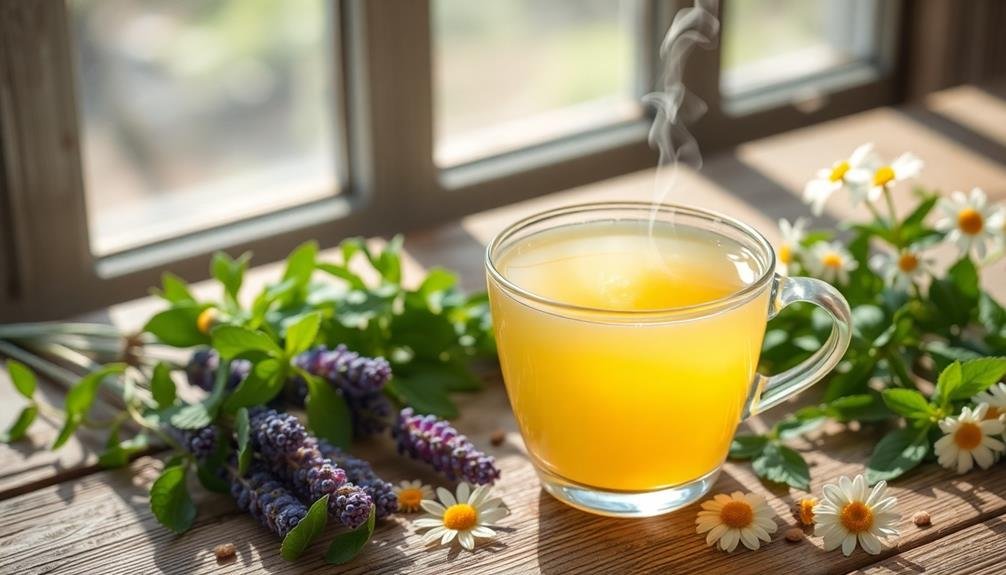
With its soothing aroma and gentle flavor, lemon balm tea offers a range of health benefits. This herbal infusion can considerably reduce anxiety and stress levels, helping you feel more relaxed and centered.
It's known to improve mood and cognitive function, enhancing your mental clarity and focus throughout the day.
You'll find that lemon balm tea can aid in better sleep quality, making it an excellent choice for those struggling with insomnia or restlessness.
It's also been shown to alleviate digestive issues, easing symptoms of indigestion, bloating, and nausea. The tea's antiviral properties may help boost your immune system, potentially reducing the severity and duration of cold sores and other viral infections.
Regular consumption of lemon balm tea can contribute to improved heart health by lowering blood pressure and reducing inflammation.
It's rich in antioxidants, which help protect your cells from oxidative stress and may lower your risk of chronic diseases.
Additionally, the tea's mild sedative effects can help manage headaches and migraines, offering natural pain relief without side effects.
Harvesting Lemon Balm Leaves
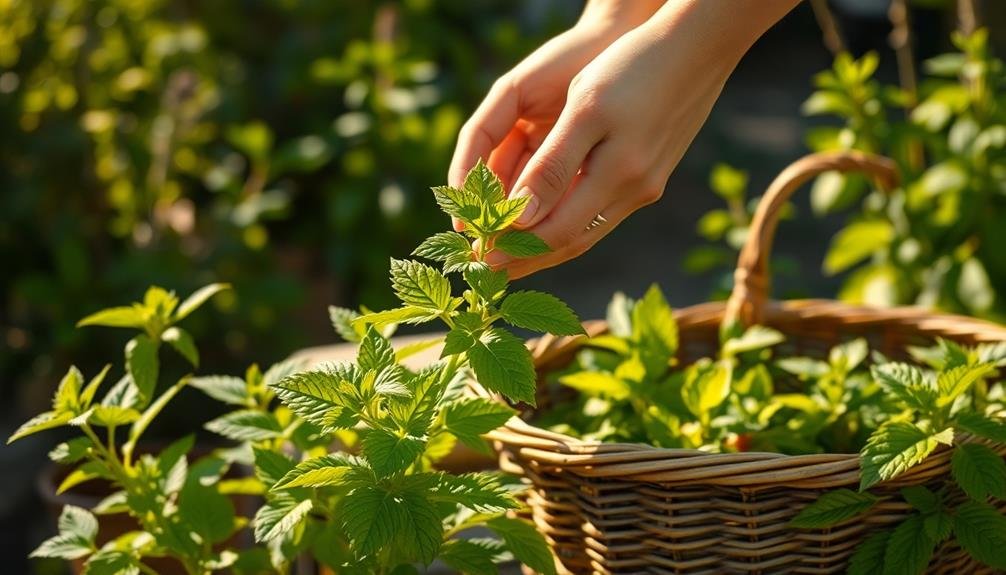
When you're ready to harvest lemon balm leaves, it's best to do so in the morning after the dew has dried but before the day gets too hot. This timing guarantees the leaves retain their maximum flavor and essential oils.
Begin by selecting healthy, vibrant leaves from the plant's outer sections. Use clean, sharp scissors or pruning shears to cut stems about 2-3 inches above the ground, just above a leaf intersection.
Don't harvest more than one-third of the plant at a time to maintain its health and encourage regrowth. As you gather the leaves, gently shake each stem to remove any insects. Inspect the leaves for damage or discoloration, discarding any that appear unhealthy.
If you're planning to use the leaves fresh, rinse them gently under cool water and pat dry with a clean towel.
For drying, bundle 5-10 stems together and hang them upside down in a warm, dark, well-ventilated area. Alternatively, you can spread the leaves on drying racks or screens.
Once fully dried, store the leaves in airtight containers away from direct sunlight to preserve their flavor and medicinal properties.
Drying and Storing Methods
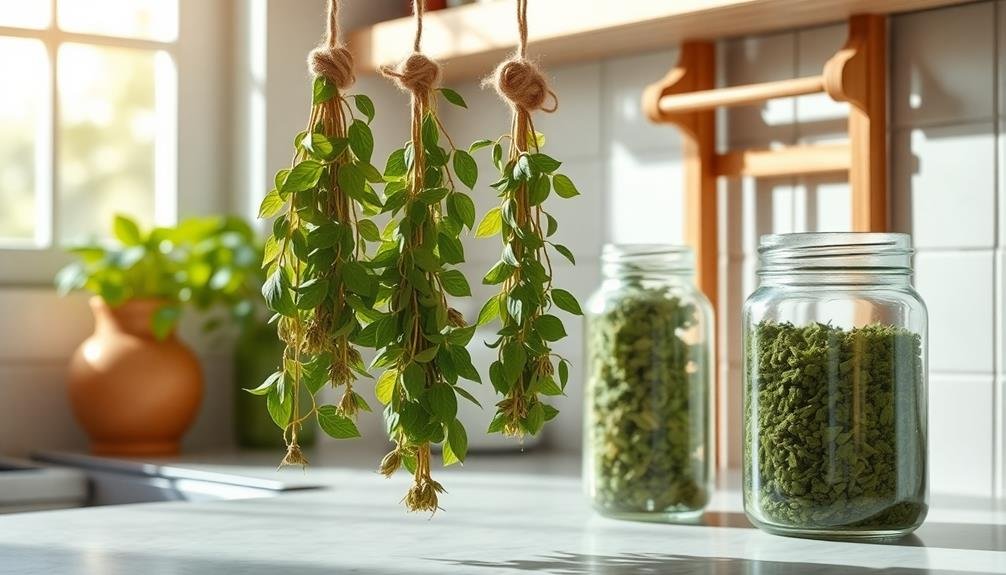
Although fresh lemon balm leaves are delightful, drying them extends their usability and preserves their flavor. To dry lemon balm, gather clean, unblemished leaves and tie them in small bundles.
Hang these bundles upside down in a warm, dry, and well-ventilated area away from direct sunlight. You'll know the leaves are ready when they're crisp and crumbly to the touch, which typically takes about a week.
For quicker results, you can use a food dehydrator or oven on its lowest setting. Spread the leaves on trays and dry them for 2-4 hours, checking frequently to prevent over-drying.
Once dried, store your lemon balm in airtight containers in a cool, dark place.
Properly dried and stored lemon balm can evoke:
- Nostalgia for sun-drenched summer days
- Excitement for future calming tea moments
- Pride in your herb preservation skills
- Contentment from a well-stocked herb pantry
- Anticipation of the soothing aroma when you open the container
Essential Lemon Balm Tea Recipe
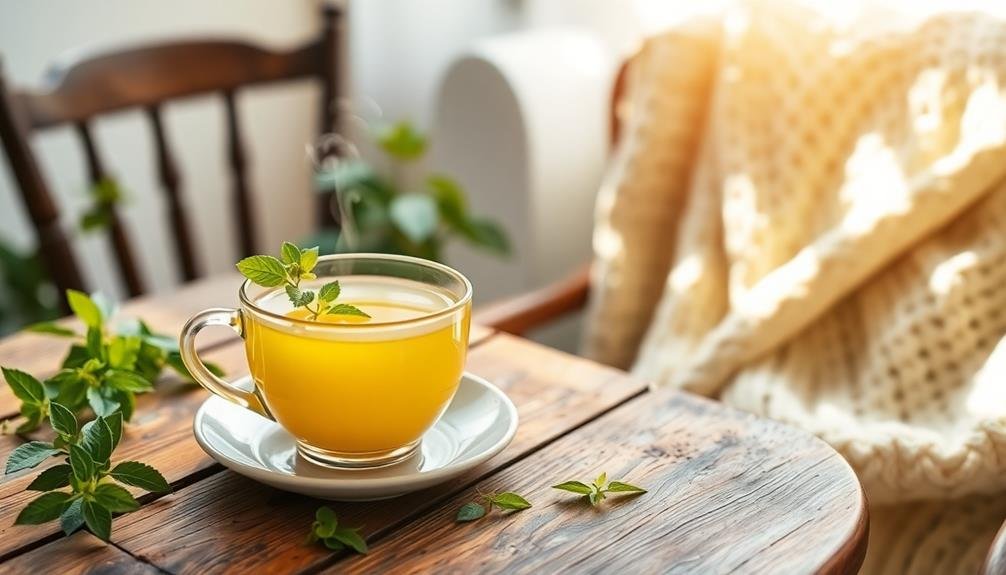
Now that you've successfully dried and stored your lemon balm, it's time to brew a soothing cup of tea. This essential lemon balm tea recipe will help you create a calming beverage perfect for relaxation and stress relief.
Start by bringing 8 ounces of water to a near boil. Place 1-2 teaspoons of dried lemon balm leaves into a tea infuser or directly into your cup. Pour the hot water over the herbs and let it steep for 5-10 minutes, depending on your desired strength.
Remove the infuser or strain the leaves if you've added them directly to the cup.
For added flavor and benefits, you can customize your tea. Try adding a slice of fresh lemon or a teaspoon of honey to enhance the taste. If you're looking for an extra boost of relaxation, consider blending lemon balm with other calming herbs like chamomile or lavender.
Drink your lemon balm tea slowly, savoring its mild, lemony flavor and allowing its soothing properties to take effect. You can enjoy this tea hot or iced, making it versatile for any season or time of day.
Complementary Herbs for Anxiety Relief
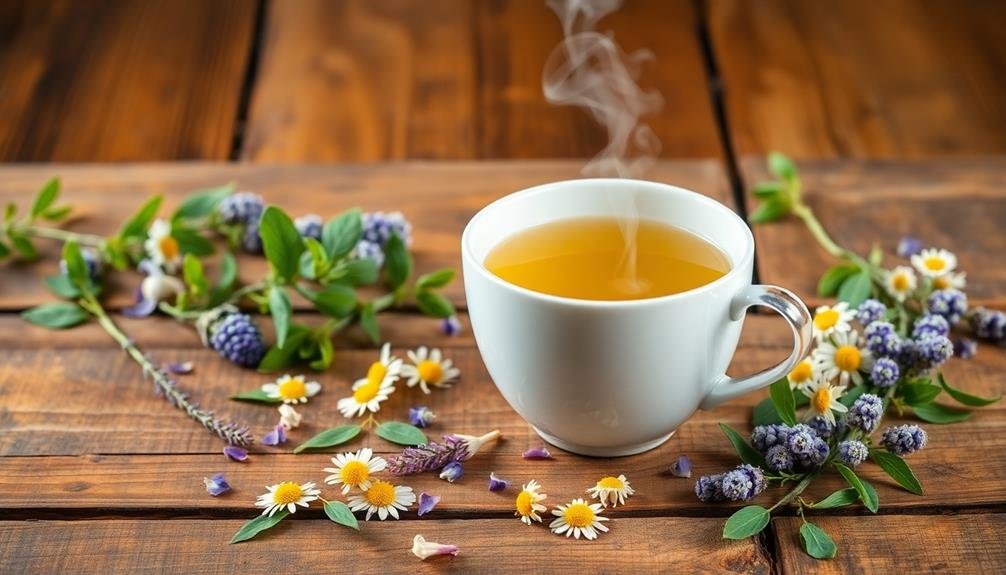
You'll find that lemon balm tea pairs wonderfully with other calming herbs for enhanced anxiety relief.
Consider adding chamomile or lavender to your lemon balm brew for a more potent relaxation blend.
If you're seeking an extra boost of tranquility, try incorporating passionflower, known for its powerful soothing properties.
Chamomile and Lavender Pairings
Synergy in herbal teas can amplify their calming effects. When you pair chamomile and lavender with lemon balm, you're creating a powerful trio for anxiety relief.
Chamomile's gentle, apple-like flavor complements lemon balm's citrusy notes, while lavender adds a floral touch that enhances the blend's soothing properties.
To create your own chamomile and lavender pairing with lemon balm tea, start with a base of 1 teaspoon of dried lemon balm leaves. Add 1/2 teaspoon each of chamomile flowers and lavender buds. Steep this mixture in hot water for 5-7 minutes, then strain and enjoy.
This combination offers numerous benefits:
- Eases tension and promotes relaxation
- Supports better sleep quality
- Reduces stress-induced digestive issues
- Calms racing thoughts and mental chatter
- Enhances overall mood and well-being
You can adjust the ratios to suit your taste preferences. For a stronger lavender flavor, increase the amount slightly, or decrease it if you find the floral notes too overwhelming.
Experiment with different proportions to find your perfect blend. Remember, consistency is key when using herbal teas for anxiety relief, so try to incorporate this soothing combination into your daily routine.
Passionflower's Soothing Properties
Among the various herbs known for their calming effects, passionflower stands out as a potent ally in the fight against anxiety. This beautiful flowering plant has been used for centuries to promote relaxation and improve sleep quality.
When combined with lemon balm tea, passionflower can enhance the overall soothing properties of your anxiety-reducing blend.
Passionflower works by increasing levels of gamma-aminobutyric acid (GABA) in the brain, a neurotransmitter that helps regulate mood and reduce stress. You'll find that adding passionflower to your lemon balm tea can help ease racing thoughts and promote a sense of tranquility.
To incorporate this herb into your blend, steep 1-2 teaspoons of dried passionflower along with your lemon balm for 5-10 minutes.
It's important to note that while passionflower is generally safe for most people, you should consult with a healthcare professional before using it regularly, especially if you're pregnant, nursing, or taking medications.
When used responsibly, passionflower can be a valuable addition to your anxiety-reducing tea arsenal, helping you achieve a calmer state of mind naturally.
Flavor Enhancers and Sweeteners
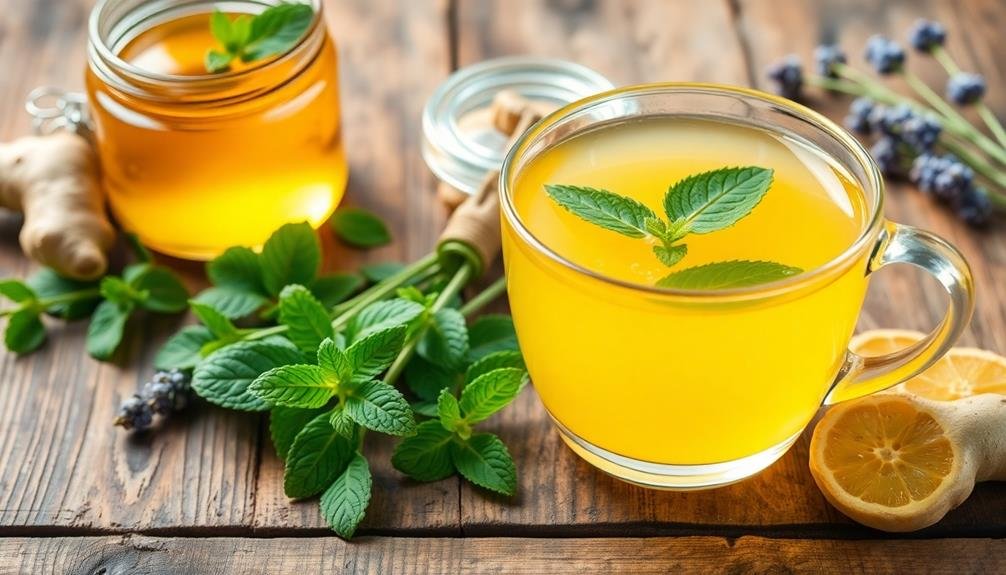
You can enhance the flavor of your lemon balm tea with natural sweeteners like honey, stevia, or agave nectar.
To complement the tea's lemony notes, consider adding a slice of fresh lemon or a sprig of mint.
For a more complex flavor profile, you might experiment with a dash of lavender or a cinnamon stick.
Natural Sweetening Options
To enhance the flavor of your lemon balm tea without resorting to refined sugar, several natural sweetening options are available.
Raw honey is a popular choice, offering a rich, floral sweetness while potentially boosting your tea's health benefits. Stevia, a zero-calorie plant-based sweetener, provides intense sweetness without affecting blood sugar levels. For a more subtle sweetness, try adding a few drops of pure maple syrup, which also imparts a unique flavor profile.
If you're looking for alternatives that double as flavor enhancers, consider these options:
- Cinnamon sticks: Add warmth and natural sweetness
- Fresh mint leaves: Provide a cooling, invigorating taste
- Dried fruit: Infuse your tea with natural sugars and fruity notes
- Vanilla bean: Impart a creamy, aromatic sweetness
- Licorice root: Offer a distinctive sweet flavor without added calories
When choosing a natural sweetener for your lemon balm tea, experiment with different options to find your perfect blend.
Remember that these alternatives not only enhance the flavor but can also complement the calming properties of lemon balm, creating a truly soothing and enjoyable beverage tailored to your taste preferences.
Complementary Flavor Additions
While natural sweeteners can enhance your lemon balm tea, exploring complementary flavor additions opens up a world of exciting taste combinations. You'll find that certain herbs, spices, and fruits can perfectly complement lemon balm's mild, citrusy flavor while boosting its calming effects.
Consider these flavor pairings to elevate your lemon balm tea experience:
| Flavor Addition | Benefits |
|---|---|
| Lavender | Enhances relaxation, adds floral notes |
| Ginger | Aids digestion, provides warmth |
| Chamomile | Promotes sleep, offers a gentle sweetness |
| Mint | Refreshes, supports digestive health |
To incorporate these flavors, simply add a small amount of the dried herb or fresh leaves to your lemon balm tea as it steeps. For ginger, use a thin slice of fresh root. You can also experiment with fruit additions like lemon or orange slices, which will amplify the citrus notes in lemon balm.
Don't be afraid to mix and match flavors to create your perfect blend. Remember, the key is to start with small amounts and adjust to your taste preferences. With these complementary additions, you'll transform your lemon balm tea into a personalized, anxiety-reducing elixir.
Brewing Techniques for Maximum Benefits
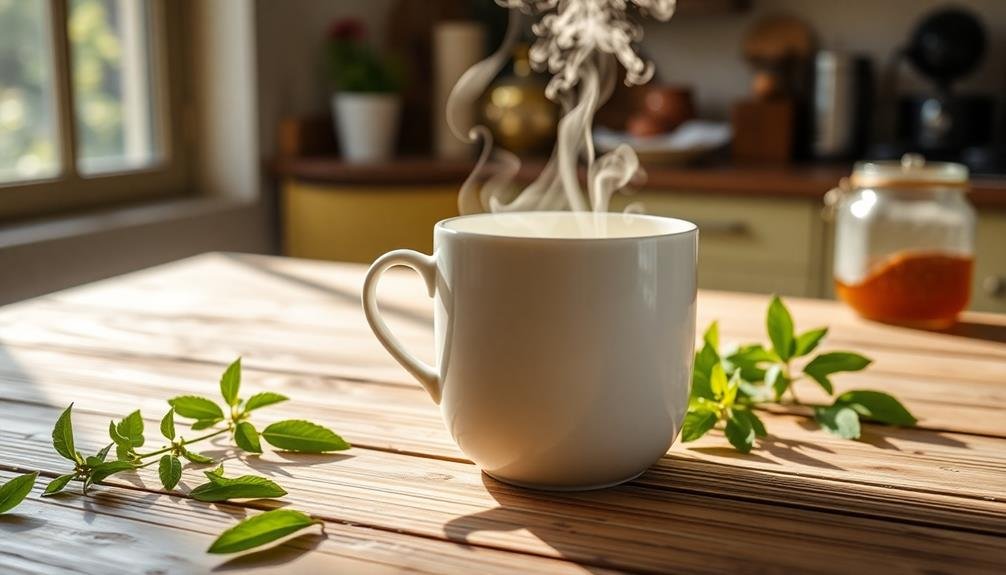
How can you access the full potential of lemon balm tea? The key lies in proper brewing techniques. Start with fresh or dried lemon balm leaves, using about 1-2 teaspoons per cup of water.
Bring water to a near-boil, then remove from heat and let it cool for a minute. Pour the water over the leaves and steep for 5-10 minutes, covering the cup to retain the volatile oils.
For a stronger infusion, consider using a French press or tea ball. This allows the leaves more room to expand and release their beneficial compounds. If you're using fresh leaves, gently crush them before steeping to release more of their aromatic oils.
To maximize the calming effects of your lemon balm tea, try these mindful brewing practices:
- Breathe deeply and set an intention for relaxation
- Use a favorite mug that brings you comfort
- Observe the leaves unfurling as they steep
- Inhale the soothing aroma before sipping
- Sip slowly, savoring each mouthful
Hot vs. Iced Preparations
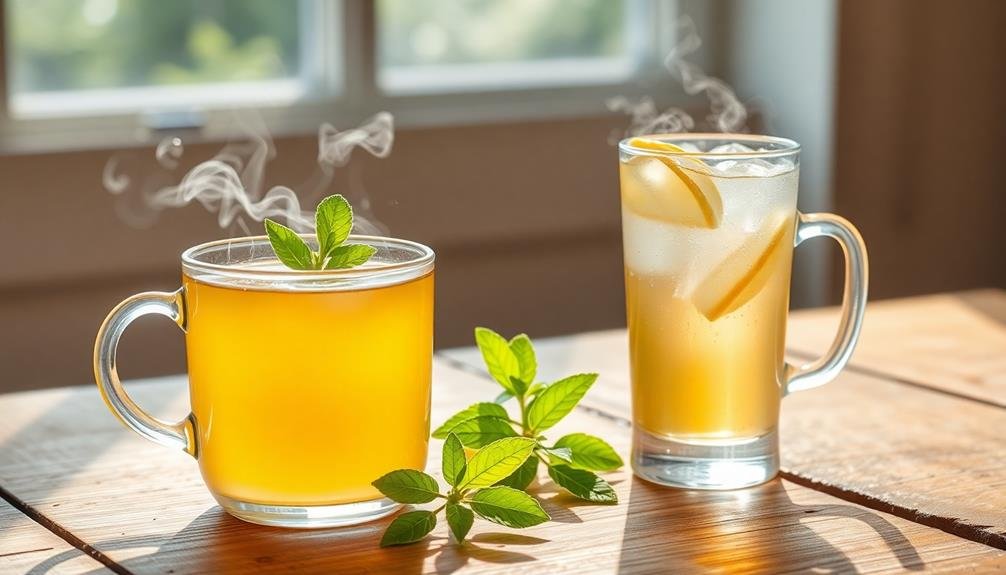
Lemon balm tea is versatile, offering benefits in both hot and cold preparations. When brewing it hot, you'll extract more of the herb's essential oils, resulting in a stronger flavor and potentially more potent calming effects. Steep the leaves in water just below boiling for 5-10 minutes, allowing the heat to release the plant's beneficial compounds.
For iced lemon balm tea, you have two options. You can brew it hot and then chill it, or use a cold brew method. Hot-brewed then chilled tea retains the intensity of flavor but may become cloudy. Cold brewing involves steeping the leaves in cold water for 8-12 hours in the refrigerator, resulting in a smoother, less bitter taste.
Both hot and iced preparations offer anxiety-reducing benefits, but you might find hot tea more soothing on chilly days or before bedtime.
Iced lemon balm tea is invigorating and can be a great alternative to sugary drinks on warm days. Experiment with both to see which you prefer, and don't hesitate to add other calming herbs like chamomile or lavender to enhance the blend's relaxing properties.
Potential Side Effects
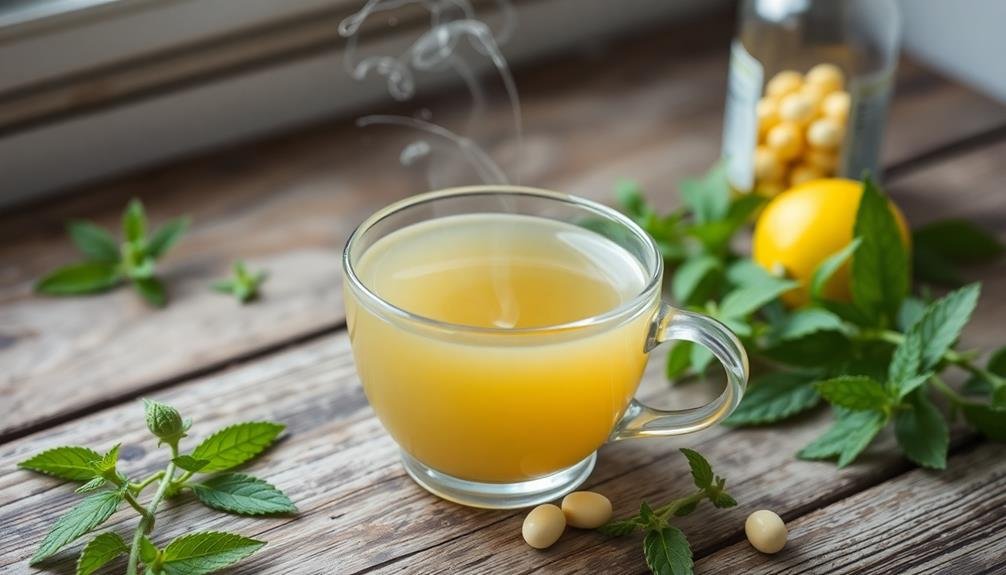
While lemon balm tea is generally safe, you should be aware of potential side effects.
You might experience mild digestive discomfort or drowsiness after consuming this tea.
If you're taking medications, it's important to consult your doctor, as lemon balm can interact with certain drugs.
Mild Digestive Discomfort
A small number of people may experience mild digestive discomfort when consuming lemon balm tea. This can manifest as bloating, gas, or occasional stomach upset. If you're new to lemon balm tea, start with a small amount to gauge your body's reaction. These symptoms are typically temporary and subside as your body adjusts to the herb.
To minimize the risk of digestive discomfort, consider the following tips:
- Brew your tea with water that's just off the boil to avoid extracting harsh compounds
- Don't steep the tea for longer than 5-7 minutes
- Start with a weak brew and gradually increase strength
- Drink the tea between meals rather than with food
- Listen to your body and adjust consumption accordingly
If you experience persistent digestive issues, consult your healthcare provider. They may recommend reducing your intake or exploring alternative calming herbs.
Drowsiness and Fatigue
Drowsiness and fatigue are potential side effects you might experience when consuming lemon balm tea. While lemon balm is generally known for its calming effects, it can sometimes lead to excessive sleepiness or lethargy, especially when consumed in large quantities or combined with other sedative herbs.
If you're sensitive to lemon balm or take higher doses, you might notice increased drowsiness or a general feeling of tiredness. This effect can be particularly pronounced if you drink the tea before bedtime or in conjunction with medications that cause drowsiness.
It's important to be aware of these potential side effects, especially if you need to stay alert for work, driving, or operating machinery.
To minimize the risk of excessive drowsiness, start with small amounts of lemon balm tea and gradually increase the dosage if needed. Pay attention to how your body responds and adjust accordingly.
If you experience persistent fatigue or drowsiness, consider reducing your intake or consulting with a healthcare professional. They can help you determine if lemon balm is the right choice for you and suggest alternative remedies if necessary.
Interactions With Medications
Lemon balm tea can potentially interact with several medications, leading to unwanted side effects or reduced drug efficacy. If you're taking any prescription drugs, it's essential to consult your healthcare provider before incorporating lemon balm tea into your routine.
This herb may interfere with sedatives, thyroid medications, and certain HIV treatments.
Be particularly cautious if you're on:
- Sedatives or sleep aids
- Thyroid hormone replacement therapy
- Antiretroviral medications
- Blood thinners
- Antidiabetic drugs
Lemon balm can enhance the effects of sedatives, potentially causing excessive drowsiness. It may also interfere with thyroid hormone absorption, affecting your thyroid function.
For those on HIV treatments, lemon balm might reduce the effectiveness of your medications. Additionally, it can interact with blood thinners, increasing the risk of bleeding, and may lower blood sugar levels in combination with antidiabetic drugs.
Daily Consumption Recommendations
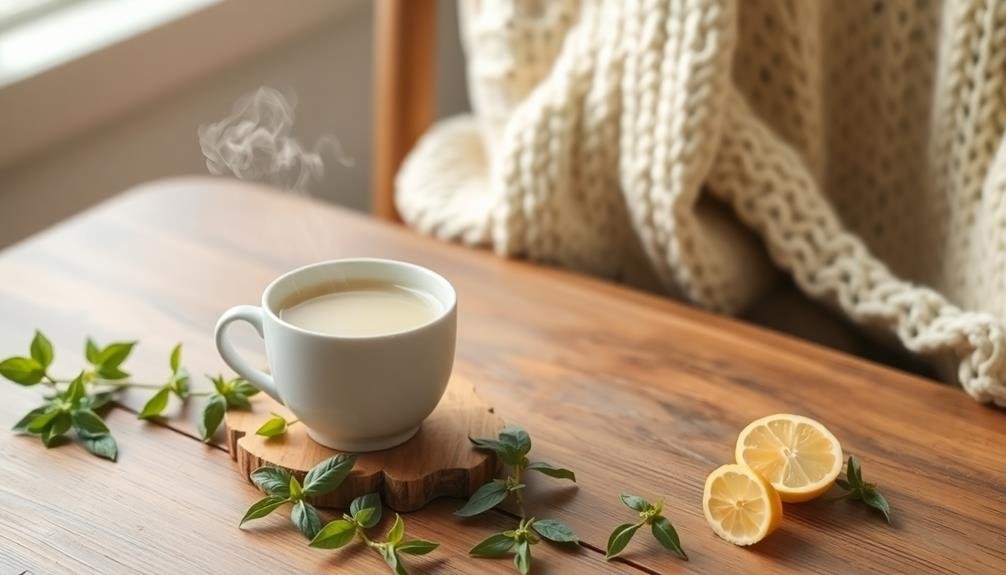
Generally, consuming 1-3 cups of lemon balm tea per day is considered safe and beneficial for most adults. You can drink it throughout the day, but many people find it particularly helpful in the evening to promote relaxation and improve sleep quality.
If you're new to lemon balm tea, start with one cup daily and gradually increase your intake to gauge your body's response.
For anxiety relief, you might consider drinking a cup about 30 minutes before stressful situations or events. To enhance cognitive function, try having a cup in the morning or early afternoon. If you're using lemon balm tea to address digestive issues, it's best consumed after meals.
Remember that while lemon balm tea is generally safe, moderation is key. Excessive consumption may lead to side effects such as headaches, nausea, or dizziness.
If you're pregnant, breastfeeding, or have any pre-existing health conditions, consult your healthcare provider before incorporating lemon balm tea into your daily routine. They can provide personalized recommendations based on your specific health needs and any medications you're taking.
Frequently Asked Questions
Can Lemon Balm Tea Help With Sleep Disorders?
Yes, lemon balm tea can help with sleep disorders. You'll find it's effective in promoting relaxation and reducing anxiety. Drinking it before bedtime may improve your sleep quality and help you fall asleep faster. It's worth trying!
Is It Safe to Consume Lemon Balm Tea During Pregnancy?
You should consult your doctor before consuming lemon balm tea during pregnancy. While it's generally considered safe in small amounts, it may have mild sedative effects. Don't use it without professional guidance when you're expecting.
How Long Does Homemade Lemon Balm Tea Stay Fresh?
Your homemade lemon balm tea will stay fresh for about 3-5 days when refrigerated in an airtight container. You'll want to consume it within this time for the best flavor and potency. Don't forget to smell it before drinking.
Can Children Drink Lemon Balm Tea for Anxiety Relief?
Yes, children can drink lemon balm tea for anxiety relief. It's generally safe, but you should consult your pediatrician first. Start with a weak brew and monitor for any reactions. Always supervise young children when drinking hot beverages.
Does Lemon Balm Tea Interact With Any Medications?
Yes, lemon balm tea can interact with certain medications. You should consult your doctor if you're taking sedatives, thyroid medications, or HIV drugs. It's also best to avoid it before surgery due to its mild sedative effects.
In Summary
You've now learned how to create your own anxiety-reducing lemon balm tea blends. By harvesting, drying, and brewing this calming herb, you're taking a natural approach to stress relief. Don't forget to experiment with complementary herbs and brewing techniques to find your perfect cup. Whether you prefer it hot or iced, remember to enjoy your lemon balm tea in moderation. With these tips, you'll be sipping your way to relaxation in no time.




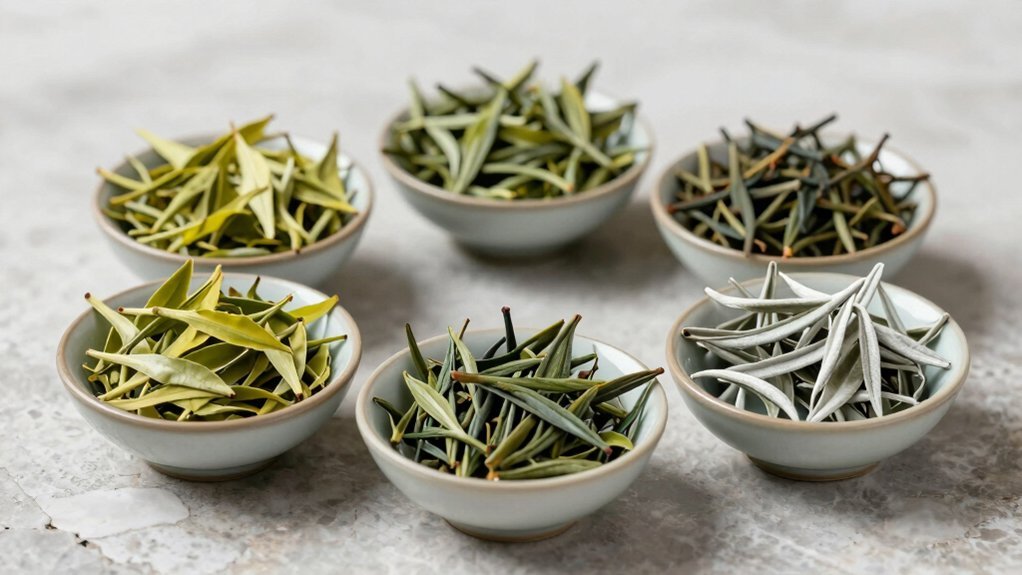
Leave a Reply